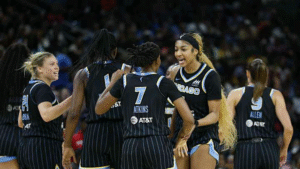
Players Around the W League Call Out Chicago Sky as the Worst-Run Franchise
As the WNBA pauses midseason for the All-Star break, The Athletic took the opportunity to reach out to approximately 40 veteran players—none rookies—about which organization they believe is the most poorly managed. The results? A variety of teams earned mentions, but one franchise overshadowed the rest.
The Dallas Wings and a catch-all “Other” category each received 7.4 percent of the votes. The illustrious Los Angeles Sparks drew the attention of 14.8 percent of players for poor organization. Team struggles this season landed the Connecticut Sun in second place with 29.6 percent of votes. But it was the Chicago Sky who topped the poll—by a wide margin.
A whopping 40.7 percent of experienced players surveyed named the Sky as the league’s most mismanaged team.
Chicago’s struggles this season are no secret. With a dismal 7–15 record, they’ve underperformed markedly, continuing a pattern of inconsistency. Yet, when asked about the reasons behind their poor play, other players point away from issues of on-court talent. Whether it’s rookie center Angel Reese making her second All-Star appearance or young big Kamilla Cardoso impressing scouts with her post play, there’s undeniable promise.

— So What’s the Real Problem?
If not talent or results, then what? The common thread in the critiques from veterans: the Sky’s practice facilities are unacceptable—some even laughably so.
“They’re practicing in a rec center,” shared one anonymous player, summing up the sentiment. This characterization underscored a lack of professional resources, a glaring deficiency for a league that otherwise prides itself on parity and high-level competition.
The reality is that, currently, the Sky hold their practice sessions at Sachs Recreation Center in Deerfield, Illinois—a multi-use community gym that doubles as a public leisure center. It falls short of the professional standards set by other WNBA teams, lacking comprehensive training amenities like advanced medical rooms, video rooms, athlete lounges, and tech-equipped workout spaces.
An Official Facility Is Finally on the Way
There is, however, a turnaround in progress. The Sky are constructing a new team-exclusive practice facility in Bedford Park, roughly 15 miles southwest of downtown Chicago. This $38 million project includes a 40,000-square-foot building equipped with two full-sized basketball courts, player lounges, locker rooms, weight-training spaces, film and meeting rooms, and modern performance labs. After breaking ground late last year, the organization expects to open its doors by December 2025.
Many within the league see this as a major step forward in the franchise’s evolution. The new facility should match or exceed the standards of their peers and help raise the team’s professional profile. But insiders caution that building a facility, while crucial, is only part of the solution.
“A Lot of Stuff Always Seems to Be Going On”
Another anonymous veteran player elaborated: “A lot of stuff always seems to be going on there.” Although unspecified, this comment hints at ongoing issues beyond just the court itself—suggesting poor organizational structure, unclear communication, or perhaps instability in coaching and leadership roles.
The indications are that the Sky’s problems are system-wide and rooted deeply in how the franchise operates off the court. From logistics to culture, something isn’t clicking, and that disconnect is apparent to others around the league.
Aiming to Change Perceptions in Chicago
With the new facility under construction and spotlight on an infusion of talent, Chicago hopes to leave behind this negative reputation. Bringing in standout rookies and improving resources are foundational steps. But players say the real work lies in changing the day-to-day experience for the athletes—cleaner practice environments, reliable staff, streamlined operations, and a professional culture that affirms the league’s values.
Franchise leadership has expressed optimism that the combination of a world-class practice center and on-court improvement will shift both internal morale and external perception. If they follow through, the Sky might just prove to the rest of the W that they’re a well-run organization after all.
Context and Analysis
1. Why This Matters In professional sports, player perception of organizational competence matters. Rookie contracts aside, established players often evaluate a team based on its investment—both symbolic and actual—in their well-being and preparation. Chicago’s public shortcomings in facility standards fed into a broader narrative of neglect. For a league succeeding on the momentum of player empowerment and visibility, optics matter.
2. Facilities as a Barometer of Investment In pro basketball—be it the NBA or WNBA—day-to-day preparation happens off the court. Chalkboards, film rooms, sports science labs, hydrotherapy pools, nutrition centers, etc., all form the backbone of modern athletic performance. The fact that the Sky were using a public rec center speaks volumes to opponents and prospects.
3. Talent Is There, but the Infrastructure Isn’t The irony in Chicago’s case: the talent is present. Reese and Cardoso, plus other experienced players, have the raw components for success—yet remain stifled by infrastructure failure. The message sent is: “We bring the talent—but we can’t support it.”
4. That “Other Stuff” When referencing “a lot of stuff … going on there,” players may imply deeper recurring issues—chaotic scheduling, poor communication, or inconsistent leadership structure. Historically, we’ve seen how organizational turmoil—like frequent coaching changes or sudden front office shifts—can damage morale even when plans technically exist on paper.
5. New Facility: A Turning Point or a Piece of the Puzzle? The Bedford Park facility could symbolically and practically reset the franchise’s trajectory. But veteran players will also want to see other improvements: a stable coaching environment, cohesive planning, full medical teams, performance staff, and logistics that run smoothly. After all, world-class hardware means little if the software—people, process, philosophy—isn’t working.
6. League Perception Matters When a critical mass of inside voices labels a team as poorly run, that perception seeps outward—to journalists, sponsors, sponsors, agents, and prospective free agents or draftees. Perception, in many ways, becomes reality—and the public narrative can be tough to shake.
What’s Next for the Sky?
Finish the Bedford Park Build The promised December 2025 completion is central to shifting perception. Two full-size courts and amenities will meet—and potentially exceed—league standards. Management must ensure transparency on timelines to keep faith.
Publicize Progress Shares photos, does interviews highlighting improvements, and invites national media inside to show changes. Let the visuals and narratives turn the public story away from “worst-run.”
Address the “Stuff” Leadership must audit internal practices—scheduling, travel, player services, communications—and fix identified points of friction. How? Maybe front office restructuring, player surveys, or bringing in consulting experts.
Attract and Retain Talent Leverage the improved infrastructure into recruiting and re-signing players. Success should breed success—pitch free agents on the new courts and modern support staff.
Show On-Court Results At the end, wins mute criticism. As the facility comes online and the team gels, Chicago needs a stretch run this season—or a meaningful playoff push next—to validate the investment and change the narrative.
Final Thoughts
The results of The Athletic’s survey—where 41 percent of veteran players tagged Chicago as worst-run—are stark. While painful, the acknowledgment also provides clarity. The path forward isn’t about rewriting the roster; it’s about rewriting the culture, infrastructure, and organizational systems. By addressing facility inadequacies, lingering operational issues, and public image, the Sky have a shot at redemption.
The athletes around the league are watching. With a shiny new Bedford Park hub on the horizon, strong leadership in place, and visible commitment to excellence, the Sky can prove themselves—and maybe climb out from under this narrative for good.
Leave a Reply